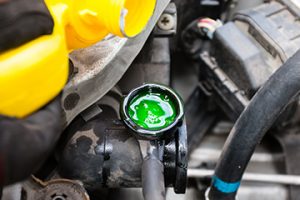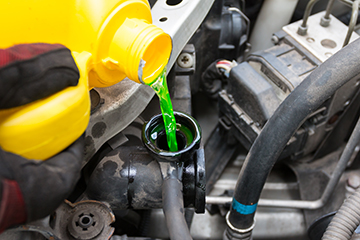The Importance of Coolant and Antifreeze Fluid and How to Tell It Needs Replacement
Fall may be here in Sun Prairie, but the weather nearing the 80s this week, is bringing us reminders of summer. And while we may enjoy the last remnants of the heat, it’s a good reminder that an engine overheating can be a disaster for our cars and trucks. So, that’s why maintaining your vehicle’s coolant levels is super important when it comes to keeping your engine running smoothly. Because, without coolant (and antifreeze), your car could face severe engine damage, costly repairs, and unexpected breakdowns.
So, in this blog, the experts at Meineke in Sun Prairie explore the importance of coolant and antifreeze, how to know when it’s time to replace them, and tips for maintaining your vehicle’s cooling system.
What Are Coolant and Antifreeze?
Coolant and antifreeze are crucial fluids that work together to regulate your engine’s temperature. And this prevents it from overheating in the summer and freezing in the winter. Coolant and Antifreeze (typically made from ethylene glycol or propylene glycol) lowers the freezing point and raises the boiling point of the liquid in your radiator. And this ensures that your engine stays within an optimal temperature range.
Why Coolant and Antifreeze Are Important
Prevents Overheating and Freezing:
Coolant helps absorb heat from the engine and dissipates it through the radiator. However, without sufficient coolant, your engine can overheat, leading to warped cylinders, blown head gaskets, or even complete engine failure. Whereas, during colder months, antifreeze prevents the liquid in the cooling system from freezing, which could crack the engine block.
Protects Engine Components from Corrosion:
Antifreeze contains corrosion inhibitors that protect your engine, radiator, water pump, and other metal components from rust and scaling. And this protection is crucial for extending the lifespan of your vehicle’s cooling system and maintaining engine performance.
Lubricates the Water Pump:
The lubricating properties of coolant protect the water pump from wear and tear. But, without adequate lubrication, the water pump can seize. And this can lead to engine overheating and potential damage.
Maintains Optimal Operating Temperature:
The blend of coolant and antifreeze keeps your engine operating at an optimal temperature range, whether it’s sweltering hot or freezing cold. And this temperature regulation helps your engine run at its best, preventing excessive wear and tear on engine parts.
Signs Your Coolant Needs Replacement
Temperature Gauge Fluctuations:
If your vehicle’s temperature gauge frequently shows higher than normal readings, this could be a sign your coolant is losing its effectiveness.
Coolant Warning Light:
Modern vehicles are equipped with sensors that monitor coolant levels and temperature. So, if the coolant warning light on your dashboard is illuminated, it’s time to check your coolant level and quality.
Visible Leaks or Low Coolant Level:
Coolant leaks are usually easy to spot because of their bright green, pink, orange, or yellow color. So, if you notice a puddle under your car or find that the coolant reservoir is frequently low. And this is a sign that you may have a leak that needs a call to Meineke in Sun Prairie.
Discolored or Rusty Coolant:
Over time, coolant can become contaminated with rust, dirt, and debris, causing it to lose its protective qualities. So, check your coolant’s color regularly; it should appear clear and vibrant. And if it looks murky, rusty, or has particles floating in it, it’s time to replace it.
Sweet Smell Inside the Cabin:
A sweet, syrupy smell inside your car is a sign of a coolant leak, often from the heater core. And this is a serious issue that needs immediate attention from the ASE certified mechanics at Meineke in Sun Prairie to avoid further engine or interior damage.
Overheating Engine:
If your engine is frequently overheating, even on short drives, your coolant might be failing to do its job. And this could be due to low coolant levels, an old or ineffective coolant, or a problem with the radiator or water pump.
How Often Should You Replace Coolant?
Typically, you should replace your coolant every 30,000 to 50,000 miles, but this can vary depending on the type of vehicle and coolant used. So, it’s best to refer to your vehicle’s owner manual for specific recommendations. And regular inspections by the auto care experts at Meineke in Sun Prairie can also help determine the right replacement interval based on your vehicle’s condition.
Maintaining Your Cooling System
- Check Coolant Levels Regularly: Make it a habit to check your coolant levels at least once a month. Also, this is especially important before long trips or during extreme weather conditions.
- Inspect Hoses and the Radiator: Look for any visible signs of wear, cracks, or leaks in your radiator and hoses. Because, these components are vital in ensuring coolant flows properly through the engine.
- Flush the Cooling System: Flushing the cooling system removes old coolant, contaminants, and any debris that might be clogging the system. And it’s recommended to flush the system according to your manufacturer’s guidelines, usually every 2-3 years.
- Use the Correct Coolant Type: Different vehicles require different types of coolant, so always use the correct one specified in your owner’s manual. Because, mixing different types of coolant can reduce effectiveness and potentially damage your cooling system. Also, opt for high quality fluids when possible.

Coolant and antifreeze are more than just fluids—they are essential protectors of your engine’s health.
Keeping your coolant and antifreeze levels at optimal levels and replacing them when necessary helps prevent overheating, freezing, and costly engine damage. So, pay attention to signs that your coolant needs replacement and maintain your cooling system. Because, then you can keep your vehicle running smoothly, no matter the season. And remember, Meineke in Sun Prairie can help you maintain your vehicle’s cooling system to ensure a reliable and long-lasting engine.
If the Meineke in Sun Prairie is not a convenient location, check out these other locally-owned Meineke locations:
MEINEKE SHEBOYGAN #2989
3667 S Taylor Drive
Sheboygan, WI 53081
Call (920) 783-6013
MEINEKE MADISON #355
4008 Milwaukee Street
Madison, WI 53714
Call (844) 374-1281
MEINEKE MADISON #1649
437 Commerce Drive
Madison, WI 53719
Call (833) 814-2314
MEINEKE SUN PRAIRIE #2057
2518 Ironwood Drive
Sun Prairie, WI 53590
Call (844) 687-9785
MEINEKE APPLETON #2136
1708 W. Wisconsin Avenue
Appleton, WI 54914
Call (866) 532-0443
MEINEKE COTTAGE GROVE #2474
222 W. Cottage Grove Road
Cottage Grove, WI 53527
Call (844) 453-2300
MEINEKE CAR CARE | LOCAL CAR CARE | LOCAL MECHANIC | SUN PRAIRIE CAR CARE | SUN PRAIRIE AUTO CARE | CAR CARE NEAR ME | OIL CHANGE NEAR ME | ASE CERTIFIED | EV CARE | EV BATTERY | CLUTCH |BRAKES NEAR ME | BRAKE FLUID | SERPENTINE BELT | TRUCK CARE | TRUCK MAINTENANCE | TIRE REPAIR | TIRES
#MEINEKECARCARE #LOCALCARCARE #SunPrairieCarCare #SunPrairieCare #CarCareNearMe #MeinekeCares #Meineke #OilChangeNearMe #OilChange #ASEcertified #Diagnositics #EV #EVbattery #UsedCarRepair #Clutch #Brakes #BrakeFluid #SerpentineBelt #TruckMaintenance #TireRepair #Tires
